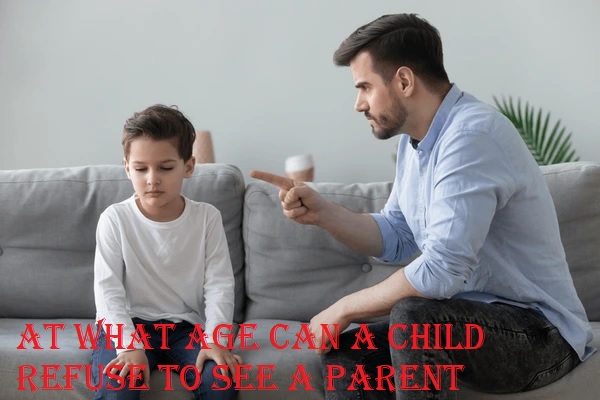Parent-child relationships are deeply complex and can become even more complicated during separation, divorce, or custody disputes. One of the most challenging questions in these situations is: At what age can a child refuse to see a parent? This question often arises when a child expresses a desire not to visit or spend time with one of their parents, usually following a divorce or breakup. It raises concerns about the child’s well-being, the influence of the parents, and the legal implications of the child’s decision. In this article, we will explore the emotional, legal, and psychological factors involved in a child refusing to see a parent, the legal age at which this is possible, and how to navigate these situations.
Table of Contents
Understanding Parental Rights and Child Custody
When parents separate or divorce, one of the most significant legal concerns is the issue of child custody. Custody arrangements are typically based on what is in the best interests of the child, and courts tend to favor arrangements that allow both parents to maintain a relationship with their child, whenever possible.
Types of Custody Arrangements
- Physical Custody: Refers to which parent the child lives with most of the time.
- Legal Custody: Refers to the rights of the parents to make decisions on behalf of the child, such as regarding education, health care, and religion.
- Joint Custody: Both parents share legal and/or physical custody of the child.
- Sole Custody: One parent has both legal and physical custody, while the other parent may only have visitation rights.
In many cases, courts are reluctant to allow a child to refuse visitation with a parent unless there is a clear reason, such as abuse or neglect. Courts typically aim to keep both parents involved in the child’s life, as studies have shown that children generally fare better when they maintain strong relationships with both parents.
The Age at Which a Child Can Refuse to See a Parent
In most legal jurisdictions, there is no specific “age” at which a child can decide not to see a parent. However, the child’s wishes and preferences become more significant as they grow older. The legal system takes into account the child’s emotional maturity and their ability to make informed decisions.
Legal Considerations
- Under 12 years old: In many places, children under the age of 12 are typically not given the legal authority to refuse visitation outright. Instead, courts focus on the best interests of the child and may consider the child’s preferences, but the final decision rests with the parents or the court.
- Ages 12-14: Children between the ages of 12 and 14 may have a stronger voice in custody decisions, but their wishes are still weighed against the overall circumstances. Courts often consider a child’s stated preference but will examine other factors such as parental influence, the relationship between the child and the parent, and the child’s emotional well-being.
- Ages 14-18: In many jurisdictions, children aged 14 and older are given more autonomy when it comes to visitation rights. In some cases, the court may give significant weight to the child’s wishes and may allow them to refuse visitation if there are no concerns about the child’s safety or well-being.
Psychological Factors Influencing a Child’s Decision
There are several emotional and psychological factors that may influence whether a child refuses to see a parent, including:
- Parental Alienation: This occurs when one parent intentionally or unintentionally manipulates the child’s feelings toward the other parent. This can lead to the child refusing to visit or communicate with the targeted parent, even if there is no legitimate reason for it.
- Fear or Abuse: A child may refuse to visit a parent if they feel unsafe or have experienced abuse or neglect. In such cases, the refusal is often a protective mechanism, and the child’s wishes should be taken seriously.
- Age and Developmental Stage: Younger children may not fully understand the implications of their decision, whereas older children or teenagers may have more complex reasons for their refusal, such as a desire for autonomy or conflict with a particular parent.
- Emotional Confusion: Divorce and separation can create feelings of confusion, guilt, and fear for children. A child may refuse to see one parent out of a sense of loyalty to the other parent, or because they are struggling with the changes in their family dynamic.
Legal and Custodial Responses to a Child Refusing to See a Parent
When a child refuses to see a parent, the situation can quickly escalate, leading to legal disputes. Here’s how the legal system typically responds:
Mediation and Counseling
Before legal action is taken, many courts require parents to undergo mediation or counseling sessions. The goal is to resolve the conflict in a manner that supports the child’s emotional well-being and encourages positive interaction between both parents. Mediation allows both parents to discuss the issue in a neutral setting, and a therapist can help the child work through their feelings.
Custody Evaluation
In more complicated cases, a custody evaluation may be conducted. A trained professional, such as a psychologist or social worker, will assess the situation and provide recommendations based on their findings. These evaluations often include interviews with both parents, the child, and other relevant parties, such as teachers or caregivers, to determine the child’s best interests.
Court Intervention
If all attempts to resolve the issue fail, the court may intervene. The judge may adjust the custody arrangement, order supervised visitation, or grant the child’s preference (if appropriate) in determining which parent they want to spend time with. However, the final decision will always prioritize the child’s safety and well-being.
The Role of Parental Behavior
It is essential for both parents to maintain a respectful and supportive relationship with each other for the sake of the child. Hostile or manipulative behavior can make it more likely that a child will refuse to see one parent. This can create an environment of tension and emotional strain, which can harm the child’s mental health and their ability to form healthy relationships.
Parental Alienation Syndrome
Parental Alienation Syndrome (PAS) is a controversial concept in family law, referring to when one parent actively works to alienate the child from the other parent. This behavior can be incredibly damaging to a child, leading to long-term emotional consequences. Courts are generally wary of claims of PAS, and if proven, it can influence custody decisions.
Preventing or Addressing the Situation
If a child is refusing to see a parent, there are several steps parents can take to address the issue:
- Maintain Open Communication: Encourage open communication with your child and listen to their concerns. Understanding the root cause of their refusal can help in finding a solution.
- Seek Professional Help: Therapy and counseling can provide a safe space for the child to express their emotions and for parents to learn effective communication strategies.
- Co-Parenting Strategies: Both parents should work together to ensure they present a united front. Establishing consistent rules, routines, and expectations across both households can provide stability for the child.
Final Thoughts of this article
The issue of a child refusing to see a parent should be approached with care and sensitivity. Parents need to understand that a child’s decision may stem from a variety of psychological, emotional, or developmental factors. The legal system also considers the child’s wishes, but ultimately, the focus will remain on the child’s best interests. Parents must prioritize their child’s emotional well-being, seek professional guidance when necessary, and work toward a resolution that supports their child’s healthy growth and development.
Disclaimer: This article provides general information and should not be taken as legal advice. Laws vary by jurisdiction, and parents facing custody disputes should consult a qualified family law attorney for personalized guidance based on their situation.







